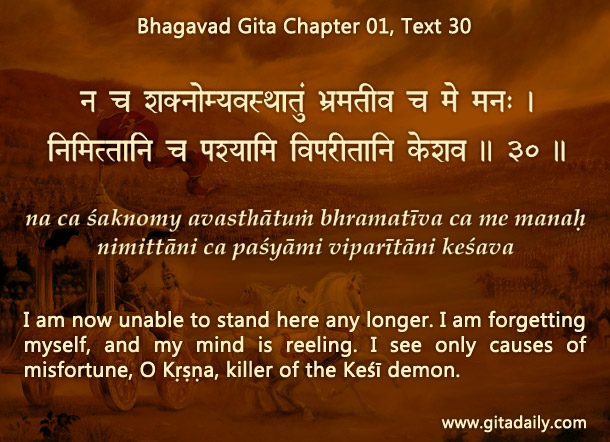When confronted with complicated situations, we can gain insight into them by using two principles. Let’s apply these principles for understanding the setting of the Bhagavad-gita
See the familiar in the unfamiliar: The Gita is spoken on a battlefield. Even if we haven’t fought a physical war, we all have to fight non-literally, when faced with difficulties externally and internally. And we all are familiar with literal wars through movies, novels and even the news. When we consider a high-stakes fight, we all can relate with the concomitant urgency, intensity and finality, especially when the stake is life itself, as in a war. By thus considering the Gita’s battlefield setting, we appreciate that the Gita isn’t just an abstract thesis of armchair philosophizing; it is wisdom that can help us in critical warlike situations we may face. Thus, the familiarity of the battlefield setting helps decrease any unfamiliarity caused by its philosophy.
See the unfamiliar in the familiar: The Bhagavad-gita’s first chapter depicts Arjuna’s breakdown when contemplating the war (01.30). We all have felt fear in the face of danger and death, yet Arjuna’s fear is strikingly different. He articulates several reasons for not fighting — reasons ranging from the wrong in killing one’s relatives; the social catastrophe resulting from the war, the long shadow caused by the war that would darken the lives of several generations. Yet one reason is conspicuous by its absence: not once does he express any fear about losing his own life. Such fearlessness in the face of death reflects a nobility of character that is rare and admirable. Seeing such character, we feel more inspired to probe deeper into the wisdom that Arjuna sought and got.
One-sentence summary:
To gain insight into a complicated situation, see the familiar in the unfamiliar and the unfamiliar in the familiar
Think it over:
- In the Gita’s setting, how can we see the familiar in the unfamiliar?
- How can we see the unfamiliar in the familiar?
- Are you facing any complicated situation? How can you apply these two principles to understand it better?
***
01.30: I am now unable to stand here any longer. I am forgetting myself, and my mind is reeling. I see only causes of misfortune.


Very powerful & practical principles that all of us can use in our life. Thank you very much Prabhu.
Happpy to be of service.
Prabhuji very deep lesson, i am able get two examples although incapable to comprehend deep meanings.
When Radhanath Maharaja was invited to speak in the gym amongst all strong Hollywood body builders.
It was not familiar situation for sanyasi who consider soul the eternal n body the perishing matter.
Maharaja addressed the gathering by bringing point of serving the supreme lord by maintaining building strong home for him.
Devotees also take care of their temples n mind other coverings where lord stays inside.
So, we can see how to find familiar principle in unfamiliar situation Place of worship
Regarding 2nd point,
I can think of Ramayan where familiar situation of villain troubling the family of protagonist n then how he rescues his family member from villain.
What’s unfamiliar here in Ramayana is impeccable characters of Lord Ram n Mother Sita, Lord Laxman n Hanuman n Bharat n Shatrugna n many more.
So much of sacrifices to uphold the Dharma in life no matter whatever is the situation without blaming other for the pain.
This is very rare UNFAMILIAR.
Thanks for your thoughtful and detailed comments.